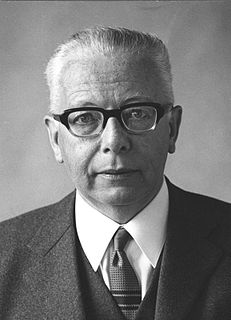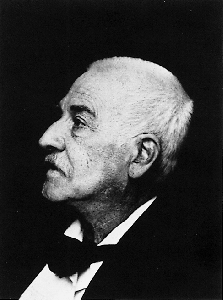A Quote by Gustav Heinemann
We have to recognize that the freedom of the individual has to be protected not only from the power of the state, but even more so from economic and societal power.
Related Quotes
Our work has only begun. In our time we have an historic opportunity to shape a global balance of power that favors freedom and that will therefore deepen and extend the peace. And I use the word power broadly, because even more important than military and indeed economic power is the power of ideas, the power of compassion, and the power of hope.
Viewed as a means to the end of political freedom, economic arrangements are important because of their effect on the concentration or dispersion of power. The kind of economic organization that provides economic freedom directly, namely, competitive capitalism, also promotes political freedom because it separates economic power from political power and in this way enables the one to offset the other
The economic freedom which is the prerequisite of any other freedom cannot be the freedom from economic care which the socialist promise us, and which can be obtained only by relieving the individual at the same time of the necessity and of the power of choice: it must be the freedom of economic activity which, with the right of choice, inevitably also carries the risk and the responsibility of that right
Every device employed to bolster individual freedom must have as its chief purpose the impairment of the absoluteness of power. The indications are that such an impairment is brought about not by strengthening the individual and pitting him against the possessors of power, but by distributing and diversifying power and pitting one category or unit of power against the other. Where power is one, the defeated individual, however strong and resourceful, can have no refuge and no recourse.
It is not simply the individual who benefits from and is protected by rights, but the society as a whole. Protected freedoms to dissent and criticize those in power help keep abuses of power in check. They combat tendencies of elites to become isolated from and ignorant of the people they deeply affect through their decisions.
The broadening of the economic order which came to be seated in the individual property owner... dramatized by Jefferson's purchase of the Louisiana Territory... "The supremacy of corporate economic power... consolidated by the Supreme Court decision of 1886 which declared that the Fourteenth Amendment protected the corporation... [the New Deal, leading to], within the political arena, as well as in the corporate world itself, competing centers of power that challenged those of the corporate directors.
Our minds tell us, and history confirms, that the great threat to freedom is the concentration of power. Government is necessary to preserve our freedom, it is an instrument through which we can exercise our freedom; yet by concentrating power in political hands, it is also a threat to freedom. Even though the men who wield this power initially be of good will and even though they be not corrupted by the power they exercise, the power will both attract and form men of a different stamp.
The seventeenth century is everywhere a time in which the state's power over everything individual increases, whether that power be in absolutist hands or may be considered the result of a contract, etc. People begin to dispute the sacred right of the individual ruler or authority without being aware that at the same time they are playing into the hands of a colossal state power.
Nevertheless, it is necessary to remember that a planned economy is not yet socialism. A planned economy as such may be accompanied by the complete enslavement of the individual. The achievement of socialism requires the solution of some extremely difficult socio-political problems: how is it possible, in view of the far-reaching centralisation of political and economic power, to prevent bureaucracy from becoming all-powerful and overweening? How can the rights of the individual be protected and therewith a democratic counterweight to the power of bureaucracy be assured?
[G]overnment can, instead of extending freedom, restrict freedom. And note ... that the 'can' quickly becomes 'will' the moment the holders of government power are left to their own devices. This is because of the corrupting influence of power, the natural tendency of men who possess some power to take unto themselves more power. The tendency leads eventually to the acquisition of all power - whether in the hands of one or many makes little difference to the freedom of those left on the outside.































